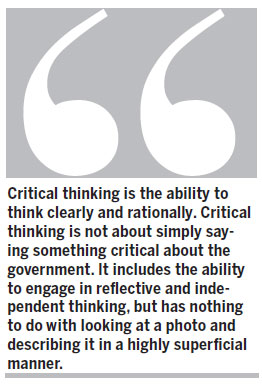Are schools offering Liberal Studies or Radical Studies?
Updated: 2014-11-11 07:41
By Lau Nai-keung(HK Edition)
|
|||||||

The Hong Kong Examinations and Assessment Authority (HKEAA) posted its reports of this year's diploma exams on its website recently. Among the data provided are two top-scoring liberal studies answers. One candidate said demonstrations and protests were more useful than taking part in consultations. The other candidate expressed similar views, saying the government had a "credibility crisis".
The HKEAA stressed that the examples were picked because the candidates showed strong critical thinking and analytical skills, and they should not be seen as an HKEAA endorsement of the candidates' views.
According to HKEAA assessment guidelines, the design of the Liberal Studies examination is intended to "emphasize the need for an enquiry approach in teaching and studying the subject". Indeed. The document also reminds teachers that "the approach used should stress that most contemporary issues are much too complex to allow for simplistic solutions".
These top-scoring liberal studies answers give us a glimpse into how this is done in practice, but unfortunately, no newspaper has quoted the answers at length. Let's have a look at the discrepancy between the ideal and the reality.
The first question on the Liberal Studies paper asked candidates to "identify and elaborate on two difficulties for the Hong Kong government to govern Hong Kong, as reflected by the demands shown in the two photographs in Source A". It does not provide the two photographs, but that's immaterial, and we can guess.
The top-scoring answer: "The first difficulty would be the low credibility of the Hong Kong government which makes it difficult to govern Hong Kong. According to source A, the protest held by civil human right (sic), the protesters hold banner of (sic) calling for the Chief Executive to step down and no cheating government (sic). This shows that the government's work does not gain recognition and support from citizens, the low credibility may make it hard to carry out and implement policy while governing Hong Kong."
The answer has some obvious grammar issues, but they are excusable. However, it is a stretch to call it displaying "strong critical thinking and analytical skills".

Critical thinking is the ability to think clearly and rationally. Critical thinking is not about simply saying something critical about the government. It includes the ability to engage in reflective and independent thinking, but has nothing to do with looking at a photo and describing it in a highly superficial manner.
The photo shows a protest with a banner calling for the Chief Executive to step down. The candidate drew a rather dull observation: "This shows that the government's work does not gain recognition and support from citizens." A more accurate statement would read: "does not gain recognition and support among a certain group of people in Hong Kong". A more critical statement would read: "It is a known fact that these dissident groups are sponsored by foreign governments."
The candidates' interpretation is certainly guided by the HKEAA, who commented on the top-scoring answer saying that the candidate "was able to identify two difficulties highlighted in Source A, namely 'low credibility' of Hong Kong government and 'not easy to a strike balance (sic)' among various voices in society."
There is nothing purely logical in this kind of examination. A statement is only as logical as the facts can support it. We certainly cannot say something like "dogs are the best transportation because they can fly".
A top-scoring answer says: "Some citizens do not trust the government because of its close relationship with Beijing and because of policies that do not put Hong Kong people first." We should first, again, note that there is nothing original, critical or innovative about this sentence. It is just an iteration of the prevalent sentiment. Worse, the conjunction "because" (used twice) left no room for reflective thinking whatsoever.
At the end of the day, how can the HKEAA consider the statement above to be analytically sound, if it does not also believe that our government's policies "do not put Hong Kong people first"?
The South China Morning Post noted, "The answers were published at a time when some pro-establishment figures are tying the introduction of compulsory liberal studies classes in 2009 to the emergence of the Occupy Central protests." I can imagine HKEAA staff wearing yellow ribbons in the office.
We may not be able to reform the curriculum. What we can do, however, is to call it what it really is, and rename it Radical Studies. Then we can introduce Patriotic Studies, and everything will balance out.
The author is veteran current affairs commentator.
(HK Edition 11/11/2014 page10)